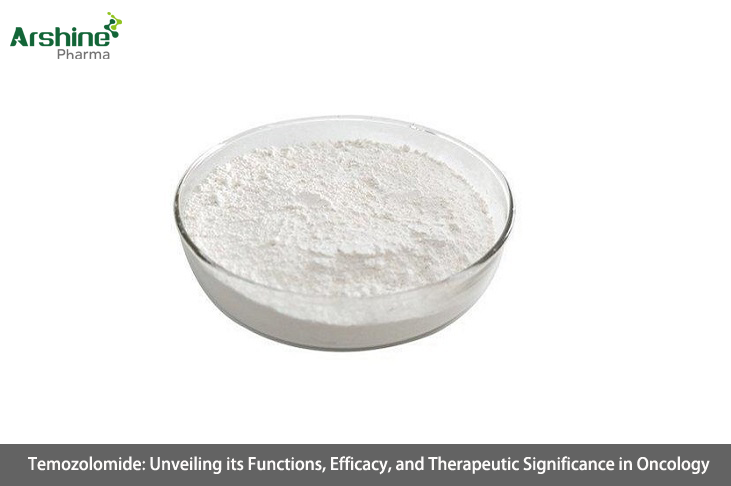
Temozolomide: A Brief Introduction
Temozolomide stands as a critical component in the realm of oncology, renowned for its efficacy in treating various malignant brain tumors and metastatic melanoma. As an oral alkylating agent, temozolomide demonstrates unique mechanisms of action, making it a cornerstone in cancer therapy. This comprehensive exploration aims to elucidate the functions, efficacy, mechanisms of action, therapeutic uses, and advancements related to temozolomide in the context of cancer treatment.
Understanding Temozolomide:
Temozolomide is an orally administered alkylating agent, chemically known as 3-methyl-(triazen-1-yl)imidazole-4-carboxamide. Upon oral administration, it undergoes rapid and spontaneous conversion to the active compound, MTIC (3-methyl-(triazen-1-yl)imidazole-4-carboxamide), which then forms methyl diazonium ions. These highly reactive compounds alkylate DNA at the O6-guanine position, leading to DNA damage and subsequent tumor cell death.
Functions and Mechanisms of Action:
1. Alkylating Action: Temozolomide acts as an alkylating agent, forming DNA adducts primarily at the O6-guanine position, which triggers DNA mismatch repair and DNA damage response mechanisms, ultimately leading to apoptotic cell death.
2. DNA Methylation: The methylation of the O6-guanine position interferes with DNA replication and transcription, resulting in DNA strand breaks and inhibition of tumor cell proliferation.
3. Blood-Brain Barrier Penetration: Temozolomide's unique property of crossing the blood-brain barrier allows for its effective use in treating primary malignant brain tumors, such as glioblastoma multiforme (GBM).
4. Schedule-Dependent Cytotoxicity: The efficacy of temozolomide is influenced by the schedule of administration, as its cytotoxic effects are greater when given continuously rather than in intermittent dosing.
Efficacy in Cancer Treatment:
1. Glioblastoma Multiforme (GBM): Temozolomide is a standard-of-care chemotherapy drug in the management of GBM, especially in combination with radiotherapy, significantly improving survival rates in some patients.
2. Anaplastic Astrocytoma and Oligodendroglioma: It demonstrates efficacy in treating anaplastic astrocytoma and oligodendroglioma, both as an adjuvant therapy following surgical resection and in recurrent cases.
3. Metastatic Melanoma: Temozolomide is utilized in the treatment of metastatic melanoma, particularly in patients with advanced disease or those who cannot tolerate other therapies.
4. Neuroendocrine Tumors: It may also have a role in managing certain neuroendocrine tumors, providing therapeutic benefit in specific subtypes.
Therapeutic Considerations and Insights:
1. Combination Therapy: Temozolomide is often used in combination with other chemotherapeutic agents or targeted therapies to enhance its efficacy in various cancers.
2. Resistance Mechanisms: Some tumors may develop resistance to temozolomide, necessitating ongoing research to understand and overcome these resistance mechanisms.
3. Adverse Effects: Common adverse effects include myelosuppression (decreased blood cell counts), nausea, vomiting, fatigue, and increased risk of infections. Close monitoring and supportive care are essential during treatment.
4. Individualized Treatment: Tailoring treatment plans based on tumor characteristics, patient factors, and treatment responses is crucial to optimize therapeutic outcomes.
5. Clinical Trials and Future Perspectives: Ongoing research explores novel approaches, including combination therapies and immunotherapies, to enhance temozolomide's efficacy and overcome treatment resistance in various malignancies.
Conclusion:
Temozolomide, as an oral alkylating agent, plays a pivotal role in the management of malignant brain tumors, metastatic melanoma, and certain neuroendocrine tumors. Its mechanisms of action, including DNA alkylation and subsequent damage, contribute to its efficacy in inducing tumor cell death. However, careful consideration of adverse effects, individualized treatment approaches, and ongoing research efforts to overcome resistance mechanisms are crucial for optimizing its therapeutic benefits in cancer treatment. As scientific advancements continue to unravel the complexities of tumor biology, temozolomide remains a significant component in the armamentarium against various malignancies, offering hope and potential improvements in patient outcomes.
